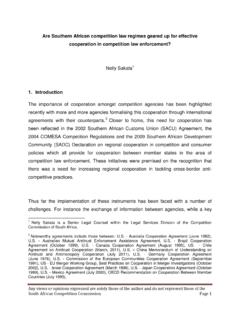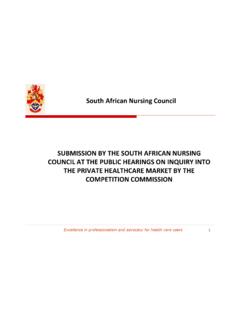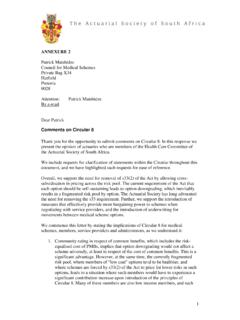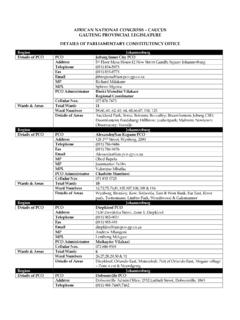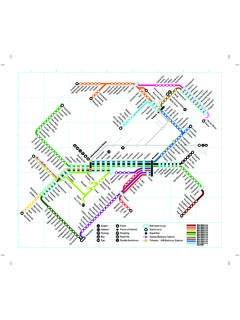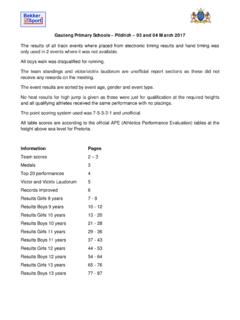Transcription of GAUTENG DEPARTMENT OF HEALTH - CompCom SA
1 GAUTENG DEPARTMENT OF HEALTH Submission to the HEALTH Market Inquiry 8 March 2016 Outline of our submission Introduction Background on provincial HEALTH system (private and public sector services) Presentation of issues relating to hospital licensing and market entry in GAUTENG Enabling regulatory framework Process for licensing private hospitals in GAUTENG Licensing in GAUTENG is permissive of market entry Concluding remarks SA s performance on public healthcare .. SA spends of GDP, countries left and above trend spend less but better performance relative to cost .. most critical HEALTH indicators are worse than those of comparable middle-low income countries that spend much less than 8% of GDP on healthcare (Christian, Crisp 2012) Gini coefficient = ; differential apportioning of resources vs.
2 68/100 use public facilities; real exp decreasing The slides summarises that public sector with more patients has the lowest number of HEALTH personnel. Gini coefficient for SA is on the high side as Ranking of SA s private HEALTH costs Our private sector competes with well developed countries, whilst the public sector competes with it own peers of the developing countries. Making South African HEALTH system to look very divided and unequal. The private HEALTH care sector in South Africa Private HEALTH care is provided at a cost that few can afford. The cost of private HEALTH care is excessive and is increasing at significantly higher rates than the rate of inflation. Private HEALTH care is skewed in favour of very costly hospital care despite the burden of disease indicating that access to less costly primary HEALTH care services should be prioritised.
3 The lack of pricing regulations which means users are overcharged and / or forced to make unaffordable out-of-pocket co-payments. Information failures that limit patients choice of medical scheme and contributes to users end up with inappropriate or insufficient HEALTH insurance ex-gratia. HEALTH market inquiry We therefore welcome the HEALTH Market Inquiry which seeks to reveal possible reasons for the high cost of private HEALTH care, identify whether anti-competitive behaviours exists within various private HEALTH care markets, and deduce how these behaviours may affect outcomes such as HEALTH care costs, access and affordability for consumers. We believe the HMI is timely given the prioritisation of universal HEALTH coverage as a national HEALTH system goal.
4 GDOH stewardship role As the GDOH, we believe we have a duty to exercise stewardship over the provincial HEALTH system across both the private and public HEALTH care sectors. We jealously guard our duty as derived from Section 27(2) of the Constitution and reflected in R158. Hence we have made it our duty to put in place instruments that can guide us in our endeavour to promote fair distribution of HEALTH , accessibility, affordability, efficiency and effectiveness of the provincial HEALTH care system. Our submission is grounded by our belief that Every person has the right to access affordable and accessible HEALTH care as enshrined in section 27 of the constitution of SA. As part of its stewardship role, the GDOH endeavours to satisfy the Constitutional mandate of progressive realization of access to quality and affordable HEALTH care for the people of GAUTENG .
5 There is a financial burden that is inherent with provision of quality HEALTH care, but that it can be achieved without our citizens having to incur catastrophic financial expenditure. Focus of our submission: licensing and market entry Broad issues raised during the HMI To what extent do licensing processes limit market entry of private facilities and equipment? To what extent provinces have provinces been or not been restrictive in allocating licenses? Some stakeholders: argue that Regulation is inappropriate and state involvement should cease so that the private sector is allowed to establish hospitals as determined by market forces. The licensing processes and criteria (the manner in which the processes are applied) are protracted, inefficient, and not transparent, which hampers market entry.
6 GAUTENG province Mid-year population estimates by province, 2015 Strengthening Capacity Dual HEALTH care system in GAUTENG Mirrors national picture: Private sector Caters for of the population* Funded through medical schemes, out-of-pocket payment Public sector Caters for of the population (large uninsured population)* Funded by government funding, minimal out-of-pocket payments (for hospital services) Stats SA GHS 2014: General Household Survey 2014. Statistical release P0318. Pretoria: Statistics South Africa; 2015. GAUTENG of people in GAUTENG have access to medical aid* of the national population* HEALTH service providers in GAUTENG HEALTH service delivery platforms Public and private sector hospital BEDS: by district Approved hospitals EKU JHB SED TSH W.
7 RAND Total Public sector District 300 660 374 1156 475 2 965 Regional 2037 568 800 400 800 4 605 Tertiary 840 485 - 857 - 2 182 Central - 3906 - 2484 - 6 390 Specialised - 427 - 1444 820 2 691 TOTAL PUBLIC 3 177 6 046 1 174 6 341 2 095 18 833 Private sector General TOTAL PRIVATE 3 188 6 150 994 4 898 1 046 16 276 * GDOH: Phase 1 Long Term Plan **GDOH Private Licensing Sub Directorate Regulatory framework Enabling legislative and policy instruments support the attainment of HEALTH care access for all Constitution of South Africa. Act 61 of 1996, Section 27 (2) National HEALTH Act 61 of 2003 R158 Regulations of 1980 White Paper for the Transformation of the HEALTH System in South Africa, 1997, ( 80:20 Bed ratio) National Development Plan, 2012 National HEALTH Insurance White Paper, 2015 Licensing regulations The Regulations governing private hospitals and unattached operating theatres (No.)
8 R 158 of 1 February 1980) provides for provinces to license new private HEALTH establishments and approve extensions to existing facilities R158, Section 2: No person shall erect, establish, extend, conduct, maintain, manage, control or render any service in a private hospital or an unattached operating-theatre unit or permit or arrange for treatment to be provided therein unless such private hospital or unattached operating-theatre unit or proposed private hospital or unattached operating-theatre unit has been registered in accordance with the provisions of these regulations. Licensing regulations (cont d) Regulation 158, Section 7 (1) No person shall erect, alter, equip or in any other way prepare any premises for use as a private hospital or unattached operating-theatre unit without the prior approval in writing of the Head of DEPARTMENT .
9 Regulation 158, Section 7 (2) (i) Any person intending to establish a private hospital or an unattached operating-theatre unit shall first obtain permission in writing from the Head of DEPARTMENT , who, after consultation with the Director, shall satisfy himself as to the necessity or otherwise for such a private hospital or unattached operating-theatre unit before granting or refusing permission. GDOH private hospital licensing process Private Licensing Directorate in the GDOH responsible for licensing: All new private hospitals and extensions to existing already registered hospitals and All private unattached theatre units. The Sub-Directorate (Administrative Office) Receives and processes licensing applications Co-ordinates the adjudication of licensing applications Compiles and maintains information on the licensing process Carries out prescribed inspections in loco site Adjudicating applications.
10 Key considerations Residential growth and development in planned area of entry Indication of the insured population in the area LSM and medical aid membership The promotion of equitable distribution of healthcare services Promoting the appropriate mix of public and private services Service demand HEALTH need (epidemiological profile in the proposed area) Fair distribution of the proposed facility and relation to existing hospitals Demonstration of availability of human resources and training of HEALTH personnel Financial sustainability Transparency At time of application, applicants are duly informed of: The process of application Required documentation needed in support of the application The key considerations are reflected on the application form as direct requests for information such as: Population to be served Epidemiological profile of catchment population Location of other private facilities in proposed location Demand for services Post adjudication, applicants are duly informed of.
